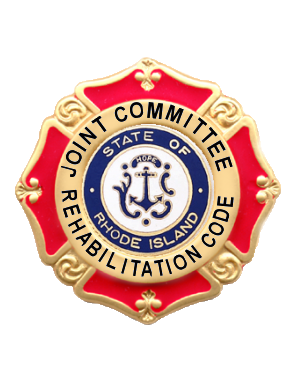Rehabilitation Code: Chapter 4
Chapter 4: Renovations
401.0 General Requirements
401.1 Renovations are defined as the change, strengthening or addition of load bearing elements, the refinishing, replacement, bracing, strengthening, upgrading or extensive repair of existing materials, elements, components, equipment and/or fixtures. Renovation involves no reconfiguration of spaces. All renovations shall comply with the requirements of this Chapter.
Exception: As modified in Section 904.0 for historical buildings.
401.2 All new work shall comply with the materials and methods requirements, as defined in Chapter 2.
401.3 The work shall not make the building less conforming with the Building Code, Mechanical Code, Plumbing Code, Rhode Island Fire Safety Code, Rhode Island Fire Prevention Code, NFPA 101, Life Safety Code for existing buildings, Electrical Code, Boiler Safety Code, Energy Code, Elevator Code, or Accessibility Code as applicable, or with any previously approved alternative arrangements, than it was before the renovation was undertaken. BFO
Exception: Minor reductions in the clear opening dimensions of replacement doors and windows that result from the use of different materials shall be allowed, unless such reductions are prohibited by ADAAG.
402.0 Additional Requirements
402.1 New interior finishes shall comply with the flame spread requirements of NFPA 101, Life Safety Code for new construction. F
402.2 New carpeting used as an interior floor finish material shall comply with the radiant flux requirements of NFPA 101, Life Safety Code for new construction. F
402.3 Replacement glazing in hazardous locations shall comply with the Safety Glazing requirements of Section 2406 of the Building Code, and paragraph 2403.1 referenced therein. B
Exceptions:
1. Glass-block walls may be repaired using like materials.
2. Louvered windows and jalousies may be repaired using like materials.
403.0 Structural Requirements
403.1 Structural elements which are uncovered during the course of the renovation and which are found to be unsound or structurally dangerous, shall be rehabilitated to comply with the load requirements of Chapter 16 of the Building Code and the applicable material stress requirements of Chapters 19 (Concrete), 20 (Aluminum), 21 (Masonry), 22 (Steel), or 23 (Wood) of the Building Code. Where renovation work includes replacement of equipment that is supported by the building or where a re-roofing permit is required, the structural provisions of this section shall apply. B
403.2 Design criteria:
Existing structural components supporting renovation work shall comply with this section. B
403.2.1 Replacement of roofing or equipment:
Where replacement of roofing or equipment results in additional dead loads, structural components supporting such re-roofing or equipment shall comply with the vertical load requirements of the Building Code. B
Exceptions:
1. Structural elements whose stress is not increased by more than five (5%) percent.
2. Buildings constructed in accordance with the conventional construction methods of the Building Code and where the additional dead load from the equipment is not increased by more than five (5%) percent.
403.3 Roof diaphragm:
Where roofing materials are removed from more than fifty (50%) percent of the roof diaphragm of a building or section of a building where the roof diaphragm is a part of the main wind force resisting system the integrity of the roof diaphragm shall be evaluated and if found deficient due to insufficient or deteriorated connections such connections shall be provided or replaced. B
404.0 Accessibility
404.1 Buildings undergoing a renovation that affects the usability of the building by persons with disabilities shall comply with Chapter 10 of this Code. B
405.0 Plumbing
405.1 Water conservation: When any water closet, urinal, lavatory faucet, kitchen faucet or shower head is replaced, the replacement fixture shall comply with the water conservation requirements specified in Table 604.4 of the International Plumbing Code, 2000. B
406.0 Boilers and Pressure Vessels
406.1 Installation or replacement of fittings, appliances and boilers shall be in accordance with the Mechanical Code. BO
406.2 Replacement boiler installed in an existing building shall comply with access and egress requirements specified in the Rhode Island Boiler and Pressure Vessel Code, 1989 edition and/or the Mechanical Code SBC-4. (Boilers over 200,000 BTU require approval by the Department of Labor and Training.) BO
406.3 A boiler room in which a new or replacement boiler is installed shall comply with the air and ventilation requirements specified in Mechanical Code SBC 4. B
407.0 Elevators
407.1 Any renovation of an existing elevator shall comply with Part XII of the ASME A 17.1-1996 and all subsequent amendments and revisions to it, as adopted by the Rhode Island Elevator Safety Code, May 15, 1999 edition. (Elevator approval by the Department of Labor and Training.) BO
Exception: The installation of new elevators shall comply with Section 501.3.
NOTE: Where the section is followed by the letter "B", "F", or "O", the following meaning shall apply:
"B" This means that the Building Official or the Plumbing, Mechanical or Electrical Inspector shall review the plans, issue the permit, inspect the installation, and approve the final certificate.
"F" This means that the Fire Official shall review the plans for approval, the Fire Official and/or the Building Official inspects the installation, and the Fire Official observes the final test and approves the final installation. The Building Official shall issue the permits.
"O" This would indicate another State agency approval and inspection is needed. An explanation will indicate the agency and approvals needed.
